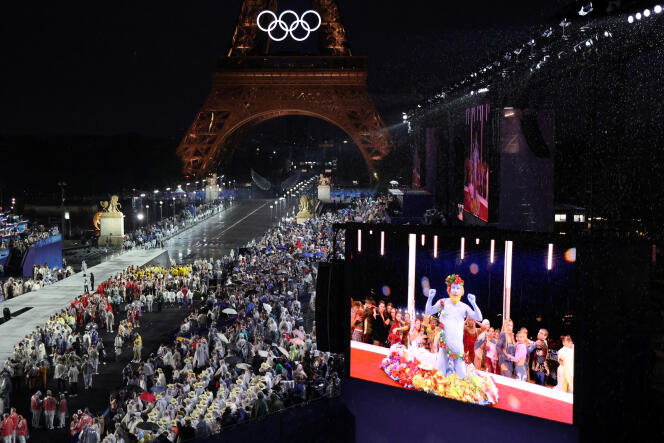Paris shines spotlight on multi crisis world as games adjust to early challenges in journey of hope from war to sport
July 25, 2024
With the world’s biggest and most important sporting occasion now underway, MICHAEL PIRRIE provides initial impressions and prospects for the Paris Olympic Games.
When Paris Mayor Ann Hidalgo plunged into the Seine River recently she attempted to ally fears about the safety of the famous waters.
This was a watershed moment, focusing on both the central Paris waterway where the Games were launched on Friday to an expectant world, and the dynamic capital city leader who has often swum against the currents to deliver the Olympic showpiece for her city.
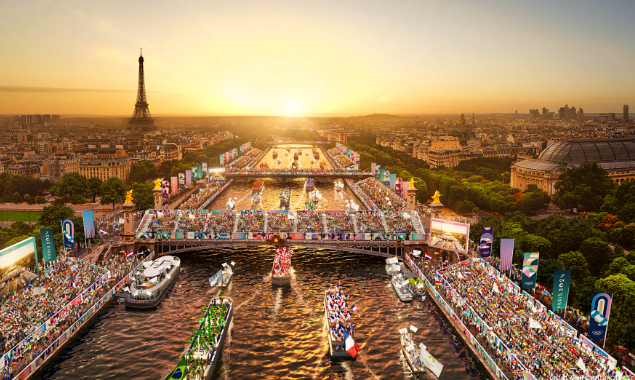
OLYMPIC WATERSHED
Hidalgo’s swim may have appeared relaxed, informal and successful but an encore performance may soon be needed as doubts surface again about the Seine’s water quality after weekend rains cancelled practice sessions for the triathlon.
Every successful Games needs a politician of influence who can dream and deliver.
Anne Hidalgo dreams big for Paris – just as the late Dame Tessa Jowell, Secretary of State for the UK Department of Culture, Media and Sport, harboured big dreams for London.
I vividly recall Tessa once saying in a discussion after the Games: “Gosh, what’s the point of being in office if you can’t do these big transformational projects.”
The irrepressible and irresistibly optimistic Jowell was the political force behind London’s wildly successful 2012 Olympic Games showpiece that Paris is now hoping to emulate after a tense and challenging start.
Paris has experienced a series of early issues as the Summer Games returns, fully configured, for the first time since the Covid pandemic restricted the size and scope of the world’s biggest event.
There are now concerns the tide may be turning against swimming in the Seine which would be a major set back following a high cost and profile cleanup operation to cleanse the historic river.
This was part of a major environment and sporting legacy for Paris, home of the French nobleman Pierre de Coubertin, who reimagined and revived the ancient sporting festival and changed the modern world.
Now the modern world is changing the Olympic Games in Paris as organisers respond to a series of early challenges, issues and threats to the Games.
The attack on France’s high speed railway network just hours before the opening ceremony was the most serious, underlining the two most vulnerable sectors of the Games – security and transport.
While quick repairs to the rail system were impressive, safety concerns emerged again shortly, after and much closer to the Games, when Palestinian supporters unfurled flags in spectator stands in front of a couple waving an Israeli flag.
Paris planners have also been responding to organisational issues that can often emerge in the initial stages of the highly complex operations and services that support the Olympic Games, which involves athletes, teams and officials from more than 205 nations and territories.
These have included the introduction of South Korean athletes as North Korean in the opening ceremony, sparking the first diplomatic incident of the Games.
The mix up had overtones of London 2012 when the North Korean women’s football team appeared on screens with South Korea’s flag
The challenges come as Paris created history – and controversy – just by adding water to its opening ceremony on the Seine.
While London combined a river and stadium setting which saw global icon David Beckham carry another global icon – the Olympic torch – down the River Thames to the main Olympic stadium in Stratford, Paris opted for a river only ceremony to introduce the athletes.
Moving the curtain raiser for the first time away from the stadium – which has long symbolised the sporting environment of the Games for athletes – created a bold, innovative and disruptive start to the first Olympics in the French capital for 100 years
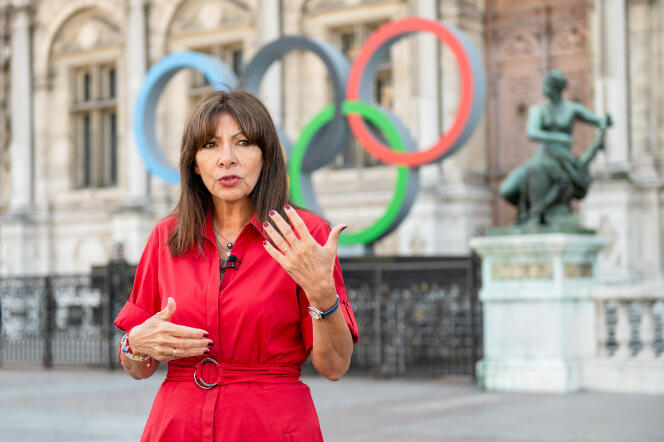
While the flotilla carrying athletes down the Seine marked a major shift away from traditional Olympic ceremony locations, the artistic content reflected a modern day interpretation of French culture that thrilled, challenged and divided the world.
If the aim of an opening ceremony is to attract world attention to the host city, Paris firmly has the world’s gaze.
The ceremony was emblematic of the French capital’s efforts to deliver one of the most ambitious and consequential Games in the recent history of the event.
The French capital is following London to become only the second city to host the Summer Olympic Games on three occasions.
The IOC is also hoping Paris can follow in London’s footsteps and deliver an electrifying Olympic experience that confirms the Games as the world’s pinnacle sporting event in the wake of Covid and challenging Games in Sochi and Rio.
It will do so with a masterplan based on the strategy London used to secure the 2012 Games over Paris, placing sport and athletes at the heart of the host city and its venues.
Instead of Wimbledon, Paris will also have Roland Garos; instead of Wembley, Stade de France; instead of Buckingham Palace, Versailles; instead of Tower Bridge, Pont Alexandre lll
NEW GAMES MODEL & ERA
Paris represents a new look for the Olympic Games
This involves integrating Olympic competitions into existing iconic sporting, cultural and historic venues and sites with landmark backdrops – from the Eiffel Tower for beach volleyball, Chateau de Versailles for equestrian and Place de la Concorde for urban sports.
Ninety five percent of Paris venues are existing or temporary.
The new model reflects IOC President Thomas Bach’s signature Agenda 2020 plus reforms to make the Games more affordable, sustainable and appealing to potential host cities.
Venues are at the heart of the massive Olympic Games operation – requiring competition and training sites for 32 world championships – and they are at the heart of urgent worldwide efforts by governments, world governing bodies and international federations to contain costs by using existing stadiums and infrastructure.
“This reduces the capital spend on new venues, which often becomes heavily scrutinised by politicians and the public in terms of expenditure of public money,” said former London 2012 venues and infrastructure director and Trivandi major events CEO, James Bulley.
“It is a challenge to find a balance between spectacular spectator experiences, sustainable cost friendly solutions and impactful legacies,” said Bulley, who helped to oversee the conversion of several London landmarks into sporting venues for the 2012 Olympic Games, including Hyde Park for triathlon
The use of existing and temporary pop-up venues and locations in Paris has eliminated the need for expensive additional stadiums and helped cut costs with fewer manipulations to the Games budget.
The shift to the lower cost Games model in Paris has helped to avoid community protests and unrest over venues that have marred previous Games.
This could mark a fundamental shift in the Games narrative for host cities, governments, and governing bodies, often forced to defend budget blow outs and little return on investment.
Paris is now moving into a more settled post Opening Ceremony pattern of operations as sport dominates all surfaces of the host city and nation – land, sea and air.
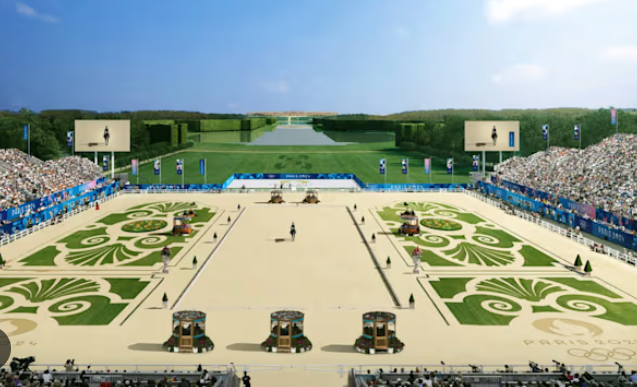
This is creating unique viewing experiences for spectators and for those watching on TV, and helping to confirm the IOC’s new focus on already built venues
This includes the conversion of La Defense Arena, Europe’s largest indoor venue, from a concert hall space that hosted Taylor Swift earlier in the year into the Olympic aquatics centre.
The venue is generating ear piercing performances louder than a Swift show from world champions like Team GB’s Adam Peaty, Australia’s Ariarne Titmus, US legend Katie Ledecky and especially French superstar Leon Marchand showing they are also swifties in the pool.
Marchand’s gold medal, one of potentially four, along with the early French national men’s Rugby Sevens team gold, and strong first up performance of Victor Wembanyama, star of the French men’s basketball team and NBA rookie of the year, are mobilising strong and growing local support behind the Games.
This is expected to grow significantly with French athletes predicted to land high on the medals table in coming days, a critical success factor for host cities.
While the recent national elections divided France politically, there are strong signs the public is uniting around the Games. This is essential for the Games to be a triumph.
If the Olympic journey from Rio to Tokyo was unparalleled, passing through the fatal global covid pandemic, the onward connection to Paris looms as another epic in the succession of theGames.
Paris 2024 may be one of the most politically explosive Games, coming at a critical juncture in world history as well as history of the host nation and Olympic Movement.
Concessions to independent neutral athletes from Russia mean they will be competing in Paris while their fellow countrymen and citizens conduct mass murder operations just three flying hours away in Ukraine.
The risks of staging the Olympics on a continent at war have also increased significantly as Russia retaliates against restrictions on its athletes and teams in Paris following the brutal full scale invasion of Ukraine.
OLYMPIC SABOTAGE
Russian cyber-attacks designed to hack and disable computer systems and data linked to Games venues, competition, and accreditation systems, power sources and organisers, along with Olympic teams from western nations supporting Ukraine, are believed to be high on the Games risk register.
Lone wolf attacks by radicalised Islamic fundamentalists using knives and cars as weapons are seen as the biggest threat, according to Olympic security experts familiar with the Paris Games.
But nothing fazes the Olympic Mayor of Paris.
Like Jowell, Hidalgo believes the Olympic Games and its underlying values and principles of peace can be a statement of solidarity, resilience and resistance against terrorism and tyranny.
And like London, devastated by a combination of deadly bus and tube suicide bombings that killed more than 50 people just hours after winning the bid for the 2012 Olympic Games – against Paris – France has been rocked in recent times by fatal fundamentalist inspired attacks.
“I said to myself that things were really, really bad and that we absolutely had to find something that also provides perspective, momentum, to young people, to the country,” the Paris Mayor said in an interview outlining why she wanted to bring the Games back to Paris.
“…(We needed) something powerful, a driving force that would bring everyone together – and I told myself the Olympic Games are the most unifying event in the world…”
Putin’s refusal to stop the slaughter in Ukraine means Russia’s cataclysmic war and the Olympic peace mission will collide in Paris.
WAR & PEACE GAMES
The Paris Games will highlight themes of war and peace after Russia rejected President Macron’s pleas for a temporary truce and as the death toll in Ukraine escalates during the Games.
The Olympic peace doves may need alternative flight paths to avoid drone and missile strikes en-route to Paris.
While Putin has refused to endorse the Olympic Truce, the Games peace message will be amplified globally with greater urgency in a host Olympic nation fiercely committed to human rights.
France, the home of such luminaries as Voltaire and Victor Hugo, and a nation of freedom fighters and defenders of civil, human and moral rights, epitomises the Olympic spirit.
It’s leader Emanuel Macron is leading the resistance against Putin in Europe to avenge Ukraine and defend the continent against the threat Russia poses to regional and world peace.
The plague of death and suffering enforced on innocent Ukraine families and residents by a superpower that threatens nuclear annihilation and uses sport to promote itself, has further hardened opposition to Russia at the Games.
THE PARIS OLYMPIC SUCCSS FACTORS
While political certainty, predictability and stability are paramount to Games planning, Macron’s diminished standing following the recent elections will not impact the Paris Games.
Like his London 2012 Games counterpart, former British Prime Minister, Tony Blair, Macron sees the Paris Olympics as part of his legacy, and has devoted significant resources across multiple government departments for the Games to succeed and these will remain firmly in place, despite the recent shock poll results.
Despite daunting global and local conditions and early challenges to the Games, Paris organisers can remain confident.
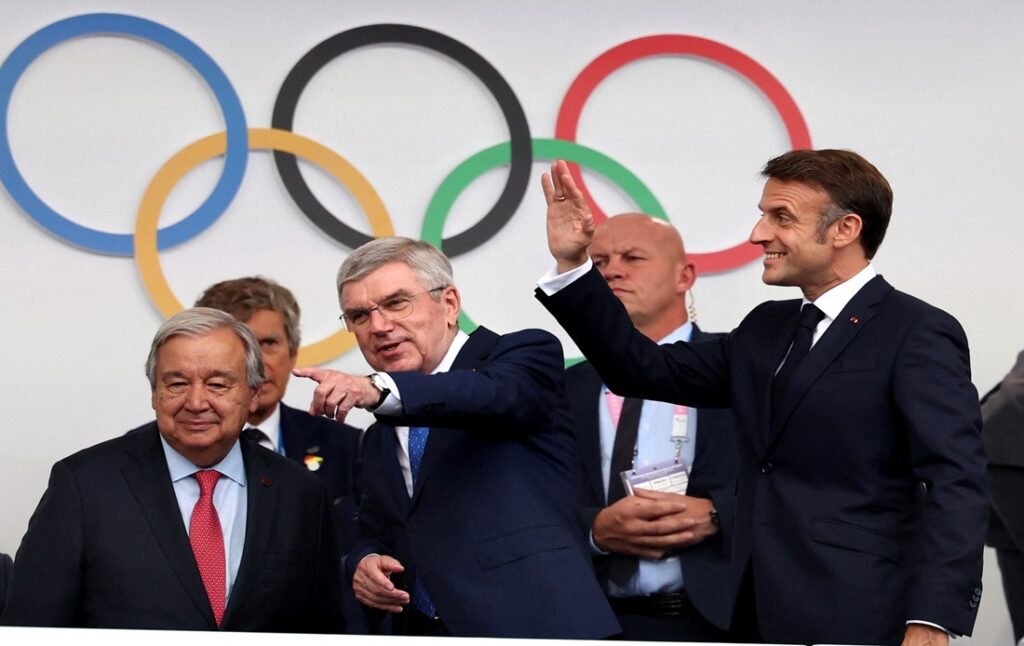
One hundred years after it was last staged, the Paris Games remains committed to its Games plan that reflects the best features of the most successful Games this century.
This includes the electrifying sporting environment of Sydney and the grandeur and spectacle of London.
OLYMPIC MASTERPIECE
While Paris will draw on its vast cultural attractions for an electrifying Games atmosphere, not all masterpieces will be found in the Louvre.
A cavalcade of the world’s greatest sports superstars will perform in Paris, from LeBron James to Simone Biles, who will be one of the women athletes competing in equal numbers to men at the Games for the first time.
The tragic death in February of Kenyan distance runner, Kelvin Kiptum, has deprived the world of one of the potential great sporting moments of the century anticipated at the Games – the first, once seemingly impossible, sub 2-hour marathon record the endurance running prodigy had set himself for Paris.
GAMES OF HOPE IN CITY OF LIGHT
The IOC president has correctly portrayed the last Summer Games in Tokyo, delivered against doomsday Covid-19 scenarios, as a symbol of recovery and hope
While Europe and the wider world may be under threat from a dictator who specialises in killing hope and who can’t be vaccinated against, the Paris Games can still provide hope
Paris has created a grand stage in an exhilarating city environment for the athletes to take the world from war to sport as symbols of hope.
The presence of Ukraine’s athletes in Paris is a powerful symbol for their homeland, crushed and on its knees, and for other nations and groups in adversity.
The Ukraine team’s presence in Paris is also a symbol of their nation’s existence and faith in sport, despite the deaths of nearly 500 fellow athletes and sports staff killed in the war so far.
The arrival of the best athletes from around the planet in Paris is also a symbol of the world’s trust in sport.
This has raised hopes the athletes can cut through the darkness and despair surrounding the war in Ukraine, Middle East violence, and other combat zones.
Michael Pirrie is a senior international communications expert and consultant who led the British Government’s global media campaign for the successful bid for the London 2012 Games against Paris, New York, Moscow, and Madrid.

